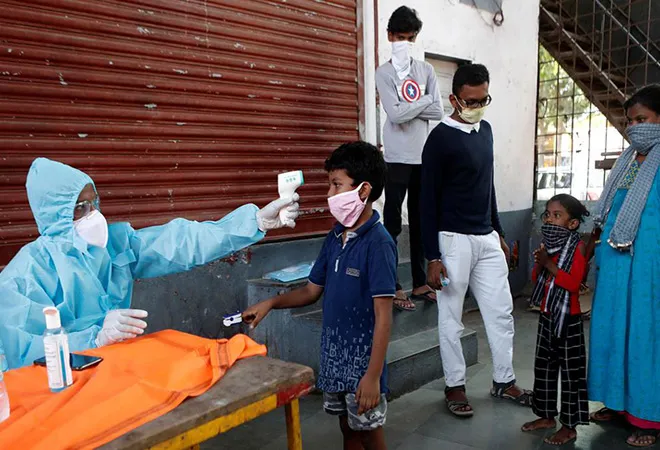
The inability of the scientific establishment to have clear answers regarding the true human costs of strict measures of coronavirus containment has spawned a range of narratives which underplay the true risk of Covid19. However, there is broad agreement that nine months into the pandemic, strict lockdowns need no longer be the first line of defense.
Uncertainty about the vaccine timelines, the effectiveness of the vaccines to prevent Covid19, as well as the ability of governments across the world to access vaccines and administer them to the respective populations have caused widespread anxiety among the populations, often amplified by the media. This week, there has been a
lot of media attention to trials for Eli Lilly’s antibody treatment and Johnson & Johnson’s Covid19 vaccine being paused over potential safety concerns.
As a second wave of Covid19 hits many countries across the world, people are worried about the virus as well as the counter-measures, which affect health as well as impact livelihoods. With no clear breakthrough in sight, the global search for a magic bullet continues. There are many experts and politicians who now feel that the strict containment measures are threatening to be worse than Covid19 itself.
Many are promoting variants of ‘herd immunity’ strategies. These approaches often advocate for an uncontrolled spread of Covid19 among the low-risk population, and claim that the acquired immunity through infection in the low-risk demographic groups will be high enough to protect the vulnerable groups. The
Great Barrington Declaration, authored and signed by Dr Sunetra Gupta, professor of theoretical epidemiology at Oxford University, Dr Martin Kulldorff, professor of medicine at Harvard University, Dr Jay Bhattacharya, professor of medicine and economics at Stanford University, and 35 other experts is at the forefront of this counter-revolution.
The Great Barrington Declaration
suggests that those who are not vulnerable should immediately be allowed to resume life as normal. The signatories advocate for opening schools and universities for in-person teaching. According to them,
extracurricular activities should be resumed and working from home for young adults should stop. In addition, the Declaration
recommends that restaurants and other businesses as well as arts, music, sport and other cultural activities should resume. It also
mentions that participation of high-risk demographic groups in these activities should be voluntary, and simple hygiene measures such as hand washing and staying home when unwell should be practiced by everyone with the sole aim of lowering the herd immunity threshold. The declaration does not mention mask-wearing or physical distancing.
All these recommendations sound very attractive on the surface for countries where lockdowns and restrictions have had a damaging impact on population health by
disrupting routine care and harming mental health, with the underprivileged bearing the greatest burden in terms of both health and livelihood. The World Health Organization (WHO) has
responded to this new development by stating that while sometimes unavoidable to break the chain of transmission in times of massive surge, there is a need to try and avoid “massive lockdowns that are so punishing to communities, to societies and everything else”.
However, what is peculiar about the Great Barrington Declaration is that it gives the impression of throwing caution to the wind. In countries like India, where hospitals are ill-equipped to handle an uncontrolled surge, any unanticipated development can be disastrous. It also needs to be kept in mind that
almost half of the officially recorded deaths by covid19 are of people aged under 60, according to the Ministry of Health and Family Welfare.
Seeing the potential danger of the Great Barrington Declaration gaining policy acceptance despite being dismissive about scientifically proven protective measures such as masking, global experts have come together to argue that herd immunity approaches are dangerous and flawed, and to present a
scientific consensus on the Covid19 pandemic. The
John Snow Memorandum, signed by 80 international researchers responds to the Great Barrington Declaration and other herd-immunity strategies that are gaining ground. The Memorandum
focuses on the need to have clear communication about the risks posed by COVID-19 and effective strategies to combat them, with winter and possibly even bigger waves of Covid19 approaching.
The John Snow Memorandum admits that in the absence of adequate provisions to manage the pandemic and its societal impacts, many countries have continued with a lockdown oriented approach and it has understandably led to widespread
demoralisation and diminishing trust. However, this does not merit abandoning a cautious, scientific approach. Countries such as Japan, Vietnam, and New Zealand have shown that robust public health responses can control transmission, and allow life to return to near-normal, the Memorandum states.
There are additional challenges: till now, no evidence for lasting protective immunity by natural infection is found, keeping open the risk of recurrent epidemics. Also, given the complications that long Covid19 presents, we exactly do not know who among the population are high-risk: in other words,
defining who is vulnerable is very complex, calling for multi-pronged, population level strategies. Thus, the John Snow Memorandum
maintains that protecting economies is inextricably tied to controlling Covid19 and protecting the health workforce from long-term uncertainty.
Surprisingly, one among the signatories of the Great Barrington Declaration is
Dr. Partha P. Majumder, professor and founder of the National Institute of Biomedical Genomics, Kalyani, (NIBMG), an autonomous institution under the Department of Biotechnology, Government of India. He is also the president of the prestigious
Indian Academy of Sciences, founded in 1934 by Professor C. V. Raman, and now an autonomous institution fully funded by the Department of Science and Technology (DST) of the Government of India.
Covid19 cases as well as deaths are clearly
on the decline in India, for now. However, experience suggests that there can be major surges in the coming weeks and months of festival season, followed by winter. Some states facing increased case numbers are actively considering stricter options including lockdowns. It is obvious that as public health measures continue to impact people’s livelihoods, there will be discussions in India around the feasibility of variants of a herd immunity-based approach. However, when the Government of India’s stand on the subject is clearly on the side of the scientific consensus, a leader of the scientific establishment openly taking an extremely controversial position is bound to trigger a lot of debate in the country in the coming days.
The views expressed above belong to the author(s). ORF research and analyses now available on Telegram! Click here to access our curated content — blogs, longforms and interviews.



 The inability of the scientific establishment to have clear answers regarding the true human costs of strict measures of coronavirus containment has spawned a range of narratives which underplay the true risk of Covid19. However, there is broad agreement that nine months into the pandemic, strict lockdowns need no longer be the first line of defense.
Uncertainty about the vaccine timelines, the effectiveness of the vaccines to prevent Covid19, as well as the ability of governments across the world to access vaccines and administer them to the respective populations have caused widespread anxiety among the populations, often amplified by the media. This week, there has been a
The inability of the scientific establishment to have clear answers regarding the true human costs of strict measures of coronavirus containment has spawned a range of narratives which underplay the true risk of Covid19. However, there is broad agreement that nine months into the pandemic, strict lockdowns need no longer be the first line of defense.
Uncertainty about the vaccine timelines, the effectiveness of the vaccines to prevent Covid19, as well as the ability of governments across the world to access vaccines and administer them to the respective populations have caused widespread anxiety among the populations, often amplified by the media. This week, there has been a  PREV
PREV


